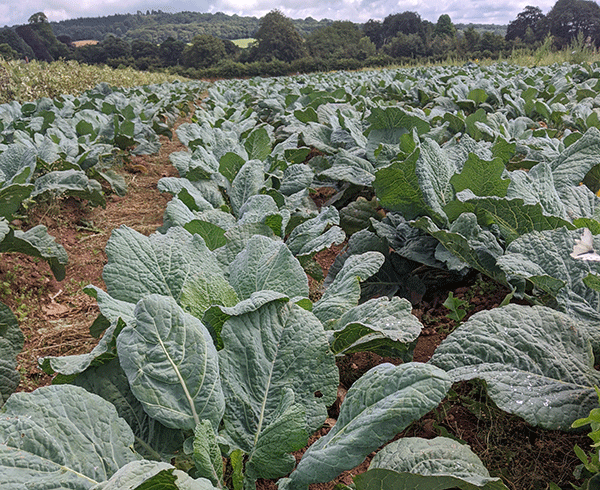Following a cold and disturbingly silent spring, with insects depleted and many swallow nests left empty, it is some relief to see nature coming back to life. The hedgerows are collapsing under the weight of their luxuriant growth. Moths, midges, toads and grasshoppers are building in abundance, and even the late-arriving swallows seem to be increasing to something more like normal.
It may not have been ideal for the beach, but a damp July and early August were good for replenishing nature – as well as establishing our winter crops of leeks, cabbage, cauliflower and kale. The last of the purple sprouting broccoli was planted last week into a warm seed bed; the soil was dry enough to work easily, but with enough moisture to draw the roots out. There has been plenty of rain, well spaced out, to allow planting on schedule; and with ample moisture stored in the soil, all crops are looking promising for a bountiful autumn and winter.
Hannah, our agronomist, says our growers need a good autumn to make up for a difficult start to the season. Wild fluctuations in temperature and moisture have upset the physiology of some crops, made it hard to plant or harvest with any regularity, and affected quality.

Meteorologists predict that with global warming of 1.5 degrees, which is all but guaranteed, we will see 40 degree summer days in the UK’s future – so we can expect more drastic disruption and crop losses ahead. Optimists point out that rising atmospheric CO2 and temperatures increase the capacity for photosynthesis and plant growth, and could create bigger yields of crops like wheat. Others observe that we will be able to grow new crops, such as soya and apricots.
Agriculture can indeed adapt to changes, particularly in our temperate latitudes and the wetter west. But, like swallows, farming will always struggle with the uncertainty caused by increasingly frequent and extreme weather events – be it late frosts, wet autumns that prevent sowing, torrential rains that wash away soil, or scorching summer droughts. We order our seeds and plants with a detailed expectation of the weather they will experience; this knowledge is site specific, and has evolved over many years.
My heart goes out to the brave swallows who face the compounded uncertainty of changing weather on two continents. But, at least for now, they have plenty of insects to fatten them up on their journey.













0 Comments